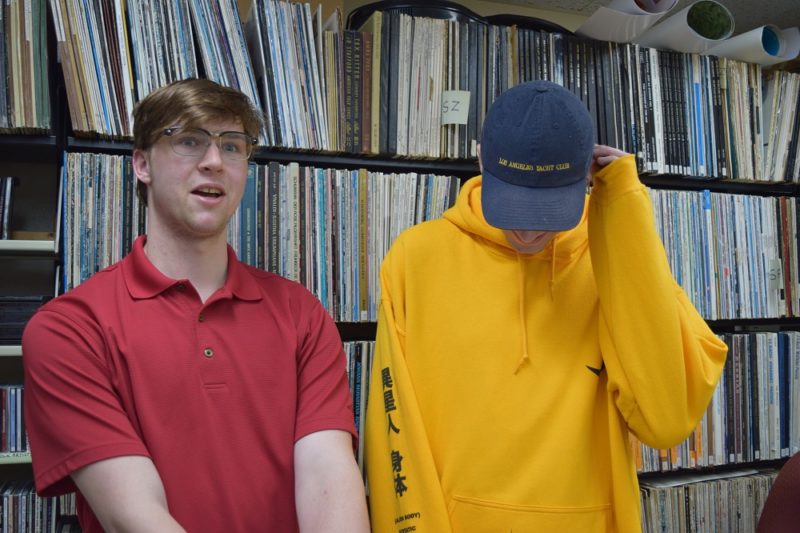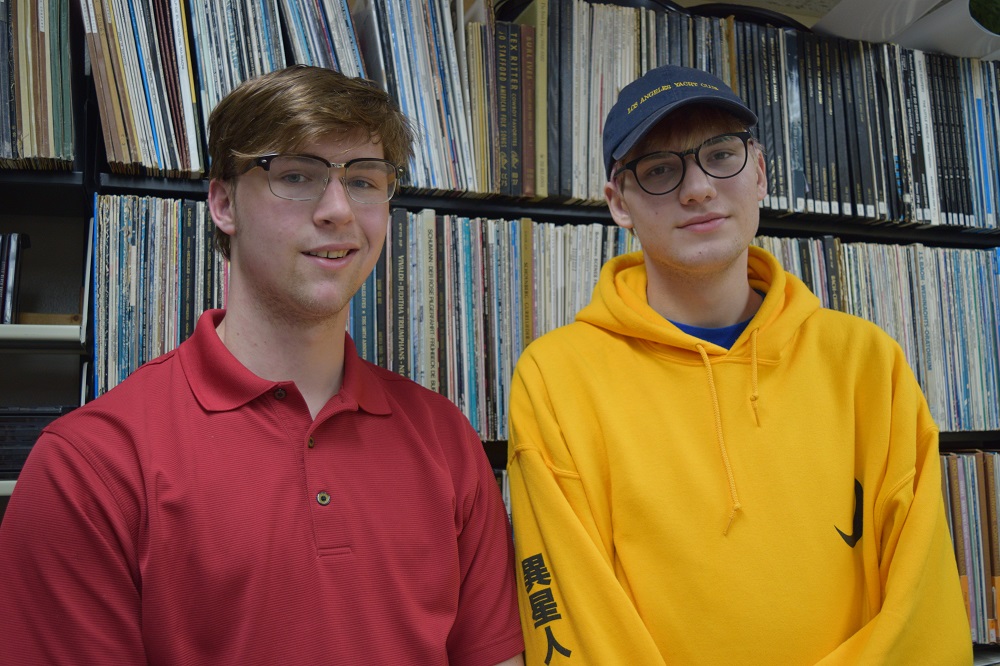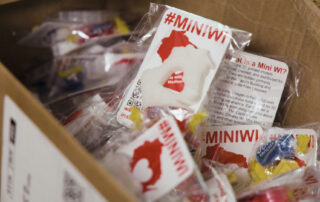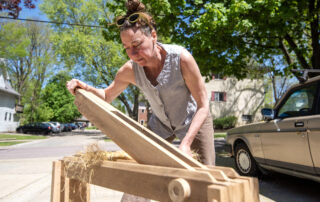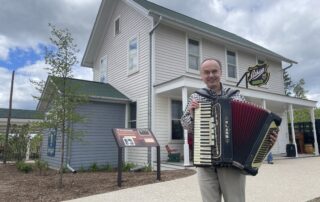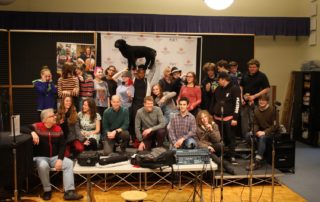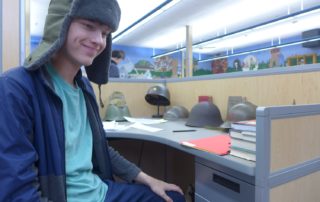There are two students at Monona Grove Liberal Arts Charter School, or MG21, that are really talented. They’re both seniors and want to pursue a music career after high school. But, the style of music they play is so different…or is it?
Matthew Schlaefer, a senior, is a singer-songwriter who plays what he calls “classic rock with a modern vibe.” He plays all the instruments: guitar, mandolin, saxophone, piano, etc. Matthew is more than happy to share his music with his friends and at open mic nights.
Simon Terrill Collins, a senior, is more into hip-hop. He raps, sings, writes, and engineers his music. Simon is more reserved when it comes to sharing his music.
They sat down to talk with one another about their craft. Here’s part of that conversation.
==
Simon Terrill Collins: Can you explain your creative process?
Matthew Schlaefer: So my creative process is multiple things. I start off with like a little snippet, like a phrase or a lick of music. Most of time, it’s a chorus part with a lead vocal with some rhythm guitar. And then, I’ll add more of a verse or a different chord structure to go along with it. Then, I’ll start producing it on my computer, like layering tracks and such. I can get a pretty good sounding result from that.
The time that I mostly write my music is probably when I’m outside, like running or biking. It sounds kind of weird, but most of the music that I do usually comes from me not actually having an instrument in my hand. Almost all of it comes from me just humming along to something and then being like, “Oh, this sounds cool.” Especially when you’re just at your prime. My prime is going full-on running like an animal. I mean, I’m not like some kind of crazy athlete, but it helps me vent out my music.
What about you, Simon?
STC: Yeah, I found a lot of similarities between our creative processes.
If we’re talking about writing, I take phrases from what my friends will say or something I’ll just think of. Then, that’ll usually sum into a whole song. Then, I will sit and listen to a beat for a long time before I actually get on it because I want to practice my verse over it. If I feel like I’m ready to record, then I’ll get on the mic and do my best.
I usually to write something that started off one saying, one phrase, or rhyme scheme. I just go off that and I try to play off of that. It’s the one thing until I can switch it to another thing. So, there are four or five lines that connect to each other about something.
I write in a bathtub. I like the kind of ambiance that comes from the water dripping. I write so well when it’s raining outside. It was pouring rain [recently] and I wanted to write so bad, but I had to go to work. I was typing in my phone as fast as I could as the ideas were coming out. So, it actually depends on like where I am and how I’m feeling.
I almost always record late at night unless I’m going to make a really loud song. The other night, I woke my whole family up at 2 in the morning because I didn’t know I was being that loud. So I record really late at night to get that vibe of the room.
I also get beats from my homies. I like to keep my circle small, but the friends that I have, they send me beats for my music. We work on collaborative projects. Or, I search online for beats and then I can purchase them. So a lot of that there are a lot of starving producers out there really small producers that I like to support.
What kind of energy do you put into your music?

Simon Terrill Collins and Matthew Schlaefer interview each other about music in an MG21 classroom. (Maureen McCollum/WPR)
MS: Good question. Actually my energy is very, very upbeat. Very upbeat. You know how there are folk songs that people cut, hopscotch, look, and dance around? They just swing and dance like square dancing? It kind of has that vibe. I don’t know.
How about you? What about your energy?
STC: It really depends on the song because my music ranges from incredibly aggressive energy to a very, very calm, like soothing, energy.
If you don’t have your own sound then people won’t want to listen to you if there isn’t one thing that makes you stand out. For some people, it’s the voice. Others, it’s their production.
Usually there’s two main different kinds of music I create. I’ll go over dark beats and just rap my ass off. I’m really heavily influenced by 1990s rap, like Eminem, kind of lyrical. That’s my angry side right? So that’s not who I am.
Then the other side is just kind of sad, lonely. My best the best way I can express my headspace and where I’m at in the moment through like poetry and lo-fi more calm music. People have hit me up in DMs before and been like, “Bro, the way you put things into words, it’s so helpful to me.” That’s crazy to me that my music has helped people. If it can help people through a tough time, that’s enough. A lot of people feel like they’re the only ones struggling with something, but I’m there putting on music that’s like, “Nope. Me too.” So yeah, I just try to write my struggles.
What about you?
MS: Well I don’t know. My music tends to be more like lighthearted and comedic. Like, I have total dark shit depression stuff, but I don’t really want to put that in music. I know it’s kind of contrasting to your vibe. I wish I could. I envy that, seriously, man.
What would you say makes your music different than others, like the big shots out there? What makes you different?
STC: I think my versatility and the type of writing that I do. What people will often tell me about my music is that they can always tell that it’s my writing because of the way I put things into words. So I’ve had lots of people tell me they could just look at my lyrics and know their mine by the way I talk about things, like the weird rhyme schemes that I use and just how I put things together. So, I think that’s something.
And when it comes to versatility, there’s so many different styles that I like to try. Alternative, just normal rap, pop songs, trap, different styles that I love experimenting with. That’s what I think is great about music is that there’s so many different styles that you can try. No I’m not successful at all of them, but I do like to try.
What about you, Matt?

Simon Terrill Collins and Matthew Schlaefer interview each other at WPR’s studios. (Maureen McCollum/WPR)
MS: Well I’m not sure what makes me entirely different from everybody else. I do like things that are kind of like catchy, poppy, snappy. But, I do like things are like kind of dark and lonesome. I like to have a good balance between that.
I like to be colorful with my lyrics, but not too colorful that is hard to understand. Sometimes, I want to start to write things that are more nonsensical, like old timey.
STC: I feel that.
MS: I like how The Beatles used to have songs that didn’t make any sense. One that comes to mind is the song, “Come Together.”
STC: Yeah, that’s how I
like to write.
MS: Nice talking to you, Simon. This was really awesome.
STC: You, too. Good being here.
(This interview has been edited for brevity and clarity.)
Hear from more MG21 students throughout the year on “Wisconsin Life” and on the special, “Classroom Frequency: Student Voices From Wisconsin.“
